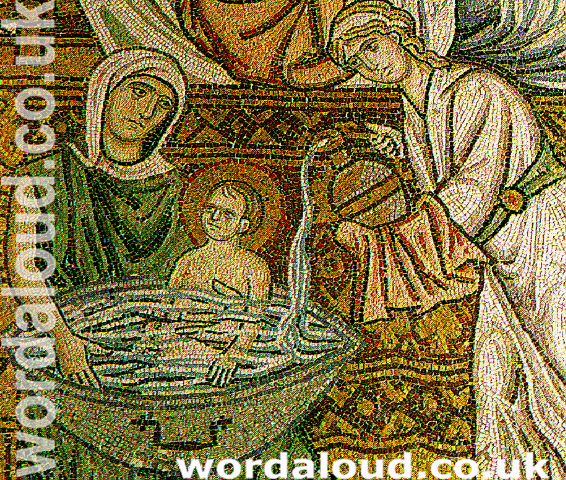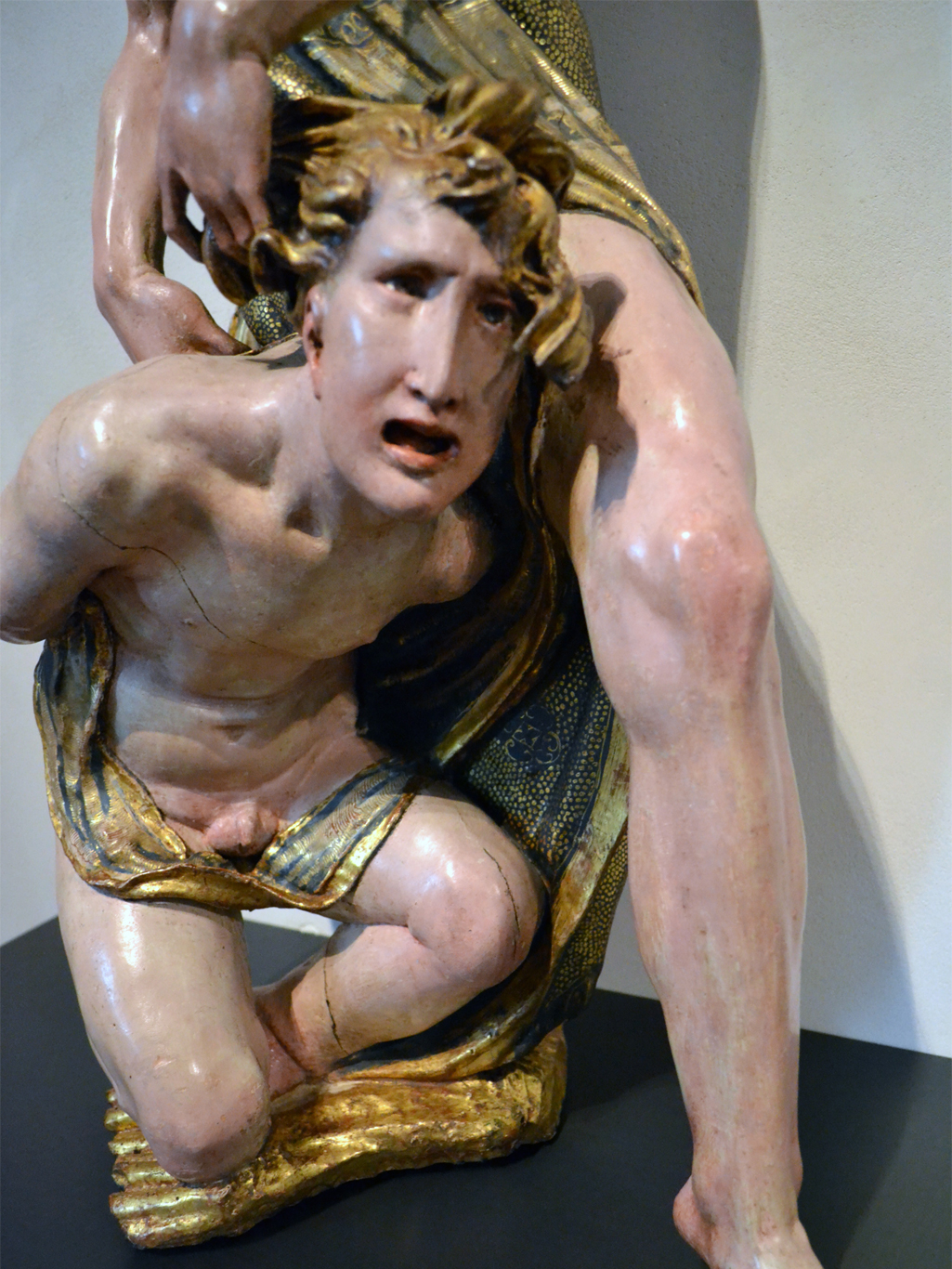Christian Art | Jesus Christ | The Cross | Christian Prayer
Office Of Readings | Week 12, Sunday, Ordinary Time | A Reading From The Treatise Of Faustinus Luciferanus On The Trinity | Jesus Christ Is Priest And King Forever
‘Jesus Christ is king and priest forever.’
Writing in a theological climate still shaped by the Arian controversy and the formulation of orthodox Trinitarian doctrine, Saint Faustinus insists upon the unique and eternal status of Christ, who is both anointed by the Holy Spirit and constituted by the Father as the one Messiah. This short treatise not only affirms the dual role of Jesus Christ but also contrasts Christ’s divine anointing with the temporary and hereditary nature of priesthood and kingship in Israel.
Historical And Scriptural Background
In the Hebrew Scriptures, kings such as and includng Saul and David were anointed with oil as a sign of divine appointment. Priests, beginning with Aaron, were also anointed, but the roles of king and priest were always kept distinct. The uniqueness of Christ lies in the unification of both roles within his person. This is crucial in establishing the superiority of Christ’s covenant over the old law.
Psalm 2: 6 declares, ‘I have set my king on Zion, my holy hill,’ showing Christ’s royal status. Psalm 110:4, cited by Faustinus, reads: ‘You are a priest forever according to the order of Melchizedek.’ This Melchizedek, both king of Salem and priest of God Most High (Genesis 14), is presented in the Letter to the Hebrews (chapter 7) as a type of Jesus Christ: eternal, without genealogy, and outside the hereditary Levitical priesthood. Faustinus draws directly from these texts to underscore that Jesus is priest not by lineage, but by divine anointing.
Theological Significance Of Christ’s Anointing
Faustinus is careful to distinguish the physical anointing of Old Testament figures from the spiritual anointing of Christ. Kings and priests of Israel were called ‘messiahs’ (anointed ones), but they were only partial types of the true Christ. Jesus, as the anointed of the Holy Spirit, received not a sign or symbol, but the fullness of divine power. This anointing, he explains, is confirmed by Scripture: ‘The Spirit of the Lord is upon me, because he has anointed me.’ (Isaiah 61:1, cited by Christ in Luke 4:18)
The anointing of Jesus Christ is not merely an historical event but a theological statement. It reveals his eternal kingship and priesthood, uniting him with the Father in divine mission. This anointing is not transferable or repeatable; it belongs uniquely to Christ, distinguishing him from every other ‘christ’.
Apostolic Witness And Early Preaching
Faustinus draws on the words of Peter in Acts 10:38 to validate this teaching: ‘Jesus of Nazareth, whom God anointed with the Holy Spirit and with power.’ Here, Peter is preaching to Cornelius, a Roman centurion, making it clear that Jesus’ ministry was empowered by the Holy Spirit. This passage confirms that Jesus’ identity as the Christ (Messiah) is not abstract, but historically and theologically rooted in his anointing and mission.
This teaching also aligns with the early Church’s emphasis on the humanity of Christ, fully assumed and sanctified. Jesus’ anointing in his human nature assures believers that our own human nature can be sanctified and elevated.
Christ’s Kingship And Priesthood In The Life Of The Church
The significance of Christ’s twofold role as King and Priest has practical implications for Christian life and worship. In the Church’s liturgy, Christ is acknowledged as our eternal High Priest, who intercedes for us before the Father (cf. Hebrews 7:25), and as our King, whose kingdom is not of this world (John 18:36) but reigns in truth and love.
In the sacraments, especially baptism and confirmation, Christians share in Christ’s anointing, becoming part of the royal priesthood (1 Peter 2:9). The oil of chrism used in these rites symbolises this participation in Christ’s mission.
Moreover, the unique priesthood of Christ underpins the sacrificial nature of the Eucharist, where he offers himself continually through the ministry of ordained priests. But even here, the ordained priest acts in persona Christi, not by his own authority, but by participation in Christ’s eternal priesthood.
Contemporary Relevance
The unity of kingship and priesthood in Christ challenges secular and clerical paradigms that divide spiritual and temporal authority. Christ’s kingship does not dominate by force, but rules through sacrificial love. His priesthood is not cultic performance, but total self-gift. For Christians today, this model redefines leadership as service and power as humility.
Christ’s spiritual anointing by the Holy Spirit also reaffirms the dignity of every baptised believer, who shares in his priestly, prophetic, and royal mission. As Pope St John Paul II often emphasised, the vocation of every Christian is to bring Christ’s reign of justice and peace into the world by living out this threefold anointing in daily life.

A Reading From The Treatise Of Faustinus Luciferanus On The Trinity | Jesus Christ Is Priest And King Forever
The Lord said to Samuel, ‘How long will you go on mourning over Saul when I have rejected him as king of Israel? Fill your horn with oil and go. I am sending you to Jesse of Bethlehem, for I have chosen myself a king among his sons.’ Samuel replied, ‘How can I go? When Saul hears of it he will kill me.’ Then the Lord said, ‘Take a heifer with you and say, ‘I have come to sacrifice to the Lord.’ Invite Jesse to the sacrifice, and then I myself will tell you what you must do; you must anoint to me the one I point out to you.’
Samuel did what the Lord ordered and went to Bethlehem. The elders of the town came trembling to meet him and asked, ‘Seer, have you come with good intentions towards us?’ ‘Yes,’ he replied ‘I have come to sacrifice to the Lord. Purify yourselves and come with me to the sacrifice.’ He purified Jesse and his sons and invited them to the sacrifice.
When they arrived, he caught sight of Eliab and thought, ‘Surely the Lord’s anointed one stands there before him’, but the Lord said to Samuel, ‘Take no notice of his appearance or his height for I have rejected him; God does not see as man sees; man looks at appearances but the Lord looks at the heart.’ Jesse then called Abinadab and presented him to Samuel, who said, ‘The Lord has not chosen this one either.’ Jesse then presented Shammah, but Samuel said, ‘The Lord has not chosen this one either.’ Jesse presented his seven sons to Samuel, but Samuel said to Jesse, ‘The Lord has not chosen these.’ He then asked Jesse, ‘Are these all the sons you have?’ He answered, ‘There is still one left, the youngest; he is out looking after the sheep.’ Then Samuel said to Jesse, ‘Send for him; we will not sit down to eat until he comes.’ Jesse had him sent for, a boy of fresh complexion, with fine eyes and pleasant bearing. The Lord said, ‘Come, anoint him, for this is the one.’ At this, Samuel took the horn of oil and anointed him where he stood with his brothers; and the spirit of the Lord seized on David and stayed with him from that day on. As for Samuel, he rose and went to Ramah.
Prayer With Jesus
O Christ our King and High Priest, you were anointed with the oil of gladness and consecrated by the Holy Spirit that you might reconcile us to the Father. Rule in our hearts by your peace, and intercede for us at the throne of mercy. May we, who share in your anointing by baptism, live lives worthy of your name: in service, in sacrifice, and in holiness. We ask this in the unity of your eternal priesthood, now and for ever.
Amen.
Glossary Of Christian Terms
- Chrism: Sacred oil used in the sacraments of baptism, confirmation, and ordination.
- Messiah/Christ: Both mean ‘anointed one’; in Christian usage, refers uniquely to Jesus.
- Melchizedek: A mysterious priest-king of Salem mentioned in Genesis and Psalms; type of Christ.
- Priesthood of Christ: The unique, eternal intercessory role Christ exercises on behalf of humanity.
- Royal Priesthood: A term for the collective dignity and mission of baptised Christians (1 Peter 2:9).
- Typology: A method of interpreting Scripture where Old Testament figures foreshadow New Testament realities.








